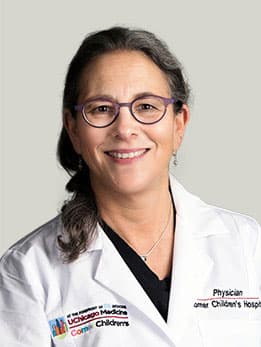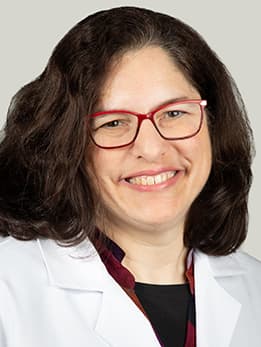Comer Children's CAPS team: How they identify and advocate for children with suspected child maltreatment

Jill Glick, MD, director of Child Advocacy and Protective Services
An infant girl with a scalded foot. A two-year-old boy with broken ribs and suspicious markings on his face. Physicians, nurses and other staff at UChicago Medicine Comer Children's Hospital care for patients with injuries like these, but they also have to answer the question: are these accidental injuries, or did they result from abuse?
The evaluation process is uncomfortable and difficult.
"Many people are afraid of this area," says Jill Glick, MD, director of Comer Children's Child Advocacy and Protective Services (CAPS). "It breaks someone's heart to have to call child welfare, because no one wants to be responsible for separating a child from their parent."
Thanks in large part to Glick, Comer has protocols in place to help identify and evaluate patients with concerns for child maltreatment. Not all hospitals have similar protocols, nor do they have child abuse pediatricians who direct an interdisciplinary team.
At Comer, any child less than two years old with an injury and any child less than three with a burn is evaluated by the CAPS team. These patients tend to be the most vulnerable, in part because they can't speak for themselves. Statistically, they are the highest risk group for child maltreatment, and lastly, protocols reduce bias.
The CAPS team also is part of the treating team of cases involving unexplained ingestions (if Methadone, for example, showed up in a child's blood unexpectedly), medical neglect (if a child with a serious disease, for example, was not taken to a critical medical appointment), failure to thrive with a social concern (if a child is not gaining weight when they should be), or any concerns for sexual abuse. Child abuse pediatricians, social workers, the primary team and subspecialists are all part of the treating team to ensure the best outcomes for both children and families.
Each morning, CAPS clinical manager Lindsay Forrey, LCSW, touches base with the social worker assigned to each patient and engages with the care team to discuss the patient’s history, physical findings and medical studies.
"It can be uncomfortable when we show up in a patient's room, with their parents," says Glick. "We just try to tell them that we're working together around their child." Often parents are relieved that there is the needed expertise to definitely state an injury is accidental.
Each week, the Comer Children’s pediatric social workers, Forrey, three board certified child abuse pediatricians, physician associate Kristen Bilka and residents all gather for the weekly CAPS team case review meeting. This is when staff members review all of the new consults since the previous week. Each case is presented, and the team reaches consensus regarding findings and interventions. Forrey says that of the 300 to 400 cases they see each year, injuries more often result from neglect, rather than abuse.
"The nice thing about having a protocoled system," says Forrey, "is it reduces the chance for selection bias and often we can expedite the discharge of a patient with an accidental injury that was reported by an outside hospital.”
According to Glick and Forrey, who have promoted the need for an interagency collaborative approach to investigate children with concerning injuries, the children at greatest risk for abuse are nonverbal. Rarely do caretakers admit to abusing their children, they say, and while a history of an injury is possible, it is impossible to discern between abuse and negligent-related injuries without corroboration by police and the state Department of Children & Family Services (DCFS). The CAPS team recognizes that errors in this determination can result in terrible consequences for the child and family.
Forrey says her time with CAPS has changed some preconceptions she had about the demographic of parents who abuse their children.
"Anyone can abuse their child in moments of high stress," she says. "We've seen professionally educated people, people who work in therapy services and parents who work in hospital settings, all be found responsible for abusing their children."
Forrey says signs of abuse and neglect can be hard to quantify because they often present similarly to injuries that could be caused by a number of things. She and Glick urge hospital staff with any concerns to call a social worker. As for non-hospital staff, anyone with concerns can call the Illinois DCFS Child Abuse Hotline at 800-25-ABUSE, (800-252-2873), or TTY (1-800-358-5117).



